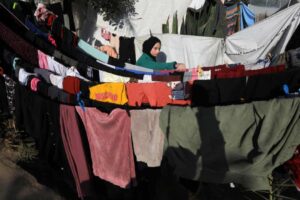
Mona, 17, used to manage intense period pain by making hot drinks, swaddling herself in blankets and knocking back painkillers. Now, sheltering in a crowded refuge in Rafah, she cannot even rely on getting hold of sanitary pads or access to a toilet.
She often vomits because of acute menstrual cramps, and has to manage that as well as bleeding, in a small house crammed with 45 displaced people where there is no privacy.
“In the place we are sheltering, there is only one bathroom shared by men, women and children. I am embarrassed waiting in line when I have my period, and it causes me mental and physical distress,” she says.
Nearly five months into Israel’s assault on Gaza, almost everyone trapped in the territory is hungry, with little access to clean drinking water, sanitation or electric power. But for women, the war has brought an additional monthly horror.
“Israeli bombings and displacement have created an immense amount of stress, but experiencing menstruation in these circumstances feels like an entirely different kind of war,” Mona says.
The UN estimates that nearly 700,000 women and girls in Gaza have menstrual cycles, which they are trying to manage with little privacy or access to pads, toilets and clean water. In the shelters run by Unrwa, the UN aid agency for Palestinians, on average there is only one toilet per 486 people.
Sarah, 27, lives in Egypt but was visiting her aunts in the north of Gaza when the war started and she became trapped. She endured her first wartime period in central Deir al-Balah, where she stayed with school friends after being separated from her relatives during a frantic evacuation.
I struggled to obtain sanitary pads and felt deeply humiliated that I couldn’t get hold of any,” she says. As Israel’s campaign moved south, she fled again to Rafah, where she has taken shelter in a tent that doesn’t even have basic sanitation.
“The impending arrival of my menstrual period has become a nightmare for me,” Sarah says. “I have to share a bathroom with more than 100 women and children.
“There are no sanitary pads or painkillers available in pharmacies and all the supermarkets here are closed because they have run out of goods.”
The cold in the tent and stomach pains from drinking contaminated water add to the misery of cramps. She considered trying to stop her flow with drugs but couldn’t find that medication either.
“The Israeli bombing is terrifying, but it becomes even more horrifying when I have my period,” she says. “I feel my mental health is deteriorating further due to the combination of the bombing and menstrual pain.”
